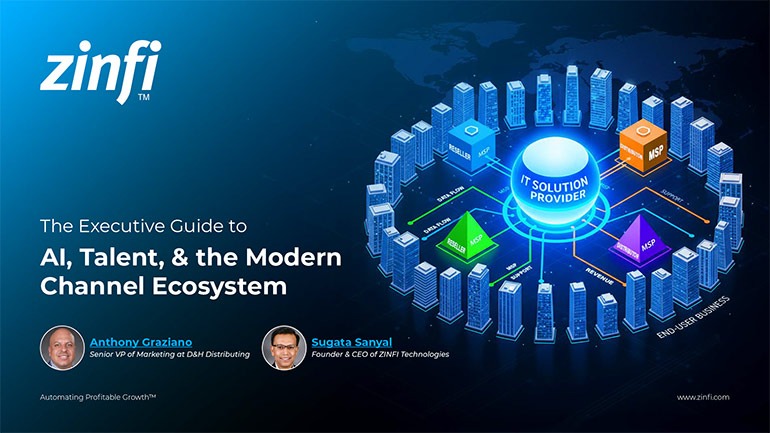Best Practices Articles

PRM Strategy for Large Manufacturing Companies: Leveraging Automation for Growth
Optimizing Partner Management with Automation for Manufacturers: Large manufacturing companies frequently encounter significant complexities in managing their extensive dealer networks and distribution channels. Manual partner onboarding and performance tracking processes lead to operational inefficiencies, compliance risks, and missed revenue opportunities across their global sales channels. This article, the third in our PRM strategy series, emphasizes how automation is indispensable for scalable and effective partner management within the manufacturing sector. We delve into the specific challenges these corporate giants face, such as ensuring consistent technical training, gaining clear visibility into product sales and service delivery, and managing complex global supply chains.
Key Takeaways:
- PRM automates manufacturing partner onboarding.
- Partner management needs product sales tracking.
- Automation scales manufacturing partner programs.
- PRM centralizes technical partner training.
- Partner management boosts manufacturing channel ROI.
- Automation improves the manufacturing partner experience.
- PRM integrates with manufacturing ERP, CRM.
- Partner management optimizes global manufacturing reach.
- Automation drives manufacturing channel sales growth.
- PRM enables data-driven manufacturing decisions.
ZINFI's PRM (Partner Relationship Management) platform offers a tailored solution by automating critical functions like onboarding workflows for specialized partners, centralizing technical training, and providing robust performance analytics for various sales channels. By offering a unified view of partner activities and integrating seamlessly with existing enterprise systems (like ERP and CRM), ZINFI PRM empowers manufacturing organizations to streamline operations, maintain rigorous quality control across their partner ecosystem, and significantly boost channel ROI. This strategic shift from manual tasks to automated processes transforms partner programs into powerful engines for market penetration and sustained growth, making partner management more efficient, transparent, and ultimately, more profitable for manufacturers.
Large manufacturing organizations today rely profoundly on extensive partner networks—comprising dealers, distributors, system integrators, and service providers—to achieve expansive market reach. These crucial partnerships help manufacturers penetrate diverse geographic regions, deliver specialized installation and maintenance services, and maintain an essential competitive edge in a globalized economy. However, managing such vast partner ecosystems presents unique and substantial challenges specific to the manufacturing sector. Standardizing partner engagement, ensuring consistent product knowledge and service quality, and scaling operations efficiently become critical hurdles for any large manufacturing enterprise. This article, the third in our PRM strategy series, delves into a vital aspect of modern partner management for manufacturers: leveraging automation for scalable partner onboarding and robust performance tracking across all sales and marketing channels.
Why Automated Partner Management Matters for Large Manufacturing Organizations
Corporate manufacturing companies face immense complexities due to their channel partners' high volume, diverse specialization, and geographical dispersion. Manual partner management processes can quickly become overwhelmed, leading to operational inefficiencies, compliance risks, and missed revenue opportunities. Consider these profound challenges specific to the manufacturing industry:
The Onboarding Bottleneck: Delaying Product-to-Market Readiness
Onboarding hundreds or even thousands of new channel partners—whether they are new dealers for heavy machinery or specialized service providers for intricate components—is a monumental task. Each partner requires specific technical training, product certifications, and access to critical resources like engineering specifications or complex pricing matrices. This often spans different languages, time zones, and stringent regulatory environments, especially for manufacturers with global supply chains and distribution networks.
- Lack of Standardization for Complex Products: Without automation, onboarding processes often vary widely across product lines, regional markets, or partner types. This leads to inconsistent partner knowledge about complex machinery or advanced materials, uneven brand representation, and potential compliance issues related to product handling or installation. Partners receive different technical support and information levels, directly impacting their initial success in selling or servicing your products.
- Information Overload and Technical Confusion: New manufacturing partners, eager to start selling or servicing products, can feel overwhelmed by a deluge of technical specifications, training manuals, service bulletins, and portal links. Without a structured, automated flow, they struggle to find the precise technical details they need, leading to frustration, errors, and delayed market entry for your products.
- Delayed Time-to-Productivity and Sales: A lengthy and convoluted onboarding process directly translates to a delayed time-to-revenue for your manufacturing business. Every day a partner spends navigating manual processes is a day they are not actively selling your equipment, installing your components, or generating service revenue. This significantly impacts your new product launch's overall channel strategy and ROI.
- Compliance Risks and Certification Gaps: Ensuring all partners adhere to legal agreements, industry-specific quality standards (e.g., ISO certifications), environmental regulations, and safety protocols is arduous when managed manually. Automated workflows help enforce necessary training steps, document certification completion, and ensure partners meet the stringent requirements of the manufacturing sector.
- Significant Resource Drain on Engineering and Channel Teams: Manual onboarding consumes an extraordinary amount of internal staff time, diverting valuable resources from core manufacturing activities. Channel managers, product specialists, technical trainers, legal teams, and IT staff spend countless hours on administrative tasks that could otherwise be dedicated to strategic initiatives like advanced partner enablement or expanding market share for new product lines.
- Poor Partner Experience (PX): A frustrating or confusing onboarding experience, particularly when dealing with complex product information or technical requirements, can sour a new partner relationship from the start. This increases the likelihood of early churn or low engagement, directly impacting partner success and the long-term viability of your dealer networks and distribution channels.
The Performance Visibility Gap: Stifling Manufacturing Channel Growth
Even after onboarding, tracking an extensive partner network's ongoing performance and contributions presents another layer of complexity for manufacturing firms. Without robust automation, gaining a clear, real-time picture of channel health and product movement is nearly impossible.
- Data Fragmentation and Silos Across Production & Sales: Sales data resides in one CRM, marketing data in an automation platform, training completion records in an LMS, and critical inventory and production data in an ERP system. Fragmented data prevents a holistic view of partner performance and hinders effective channel management for specific product lines or territories.
- Lack of Real-Time Sales and Inventory Insights: Relying on weekly or monthly reports generated manually means decisions about production runs, inventory levels, or promotional pushes are often based on outdated information. Market shifts, emerging trends for specific products, or sudden dips in partner sales go unnoticed until it's too late to react effectively, potentially leading to overstocking or missed sales opportunities.
- Inability to Identify Top Product Performers or Service Underperformers: Without consolidated, real-time data on product sales, service contract renewals, or spare parts sales, channel managers struggle to identify which partners excel with specific product categories and which need additional support or intervention. This makes it challenging to allocate resources effectively for maximum impact on channel sales.
- Ineffective Incentive Management for Complex Products: Designing and managing incentive programs, spiffs, or MDF (Marketing Development Funds) for diverse product lines or specialized services becomes challenging when performance data is inconsistent or delayed. Rewards might not align with actual impact on high-value products, potentially demotivating key channel partners.
- Forecasting Inaccuracies Impacting Production: Relying on partners' self-reported data or incomplete internal records for sales projections introduces significant inaccuracies. This directly impacts production planning, supply chain logistics, and overall business forecasting—areas critical for efficient manufacturing operations.
- Channel Conflict and Inefficiency in Service Territories: Without clear visibility into deal registration, overlapping sales territories for specific product models, or inconsistent pricing structures, channel conflict can arise. This erodes trust within the partner ecosystem and slows sales cycles, affecting overall market share.
These challenges directly impact a large manufacturing organization's ability to drive channel sales, optimize channel ROI for specific product lines, and sustain a competitive advantage. A strategic partner management approach incorporating advanced automation is no longer optional. It's an absolute necessity for sustainable growth, ensuring efficient channel management and global market penetration. Automation frees up valuable internal resources, ensures compliance across the entire partner ecosystem, and provides real-time, actionable insights crucial for informed decision-making by partner marketing leads, channel managers, and VPs of Sales. It fosters greater partner experience and drives superior partner success for manufacturing giants.
The Core of an Effective PRM Strategy: Automation for Manufacturers
Automation within the PRM context fundamentally transforms how manufacturing organizations manage their channel partners. It shifts partner management from a reactive, manual process to a proactive, data-driven PRM strategy. Automation means leveraging technology to execute repetitive tasks, enforce standardized workflows, and synthesize data across the entire partner lifecycle – from recruitment and specialized onboarding to engagement, technical enablement, compensation for product sales, and comprehensive performance measurement.
Consider the entire partner lifecycle, tailored explicitly for manufacturing:
- Recruit: Automation can streamline partner application and vetting processes, ensuring new dealers or distributors meet specific financial or technical criteria.
- Onboard: This is a prime area for automated workflows, focusing on complex product training and compliance certifications.
- Engage: Automated communications, product updates, and specialized content distribution keep partners connected to the latest manufacturing innovations.
- Enable: Delivering technical training, marketing materials for new product launches, and sales tools precisely when and where partners need them for effective channel sales.
- Compensate: Automating commission calculations for complex product bundles and MDF approvals ensures accuracy and timely payments to channel partners.
- Measure: Automated data collection and reporting provide real-time performance insights into product sales and service delivery.
By implementing automation, large manufacturing organizations can ensure consistency in their dealer networks, reduce human error in complex processes, accelerate operational speed (e.g., getting new product lines to market through partners faster), and reallocate human capital to higher-value strategic initiatives like product development or optimizing global logistics. This significantly boosts overall channel management efficiency and effectiveness within the manufacturing sector.
How ZINFI PRM Transforms Partner Management for Manufacturers
ZINFI's PRM (Partner Relationship Management) platform is specifically designed to address these intricate challenges large manufacturing organizations face, providing a comprehensive and automated solution for an effective PRM strategy. ZINFI empowers these businesses to build a robust, scalable, highly productive partner ecosystem that drives product sales and service excellence.
Automated Partner Onboarding Workflows: Accelerating Product-to-Market Time
ZINFI PRM revolutionizes the onboarding process for new channel partners in manufacturing. It moves beyond simple checklists, creating dynamic, automated workflows that guide partners seamlessly through every step, emphasizing product knowledge and operational readiness.
- Customizable Onboarding Paths for Diverse Partner Types: ZINFI allows you to tailor onboarding experiences based on partner type (e.g., authorized reseller of finished goods, service center for machinery, distributor of raw materials, OEM partner). This ensures partners receive only the relevant technical information and certifications, reducing clutter and speeding up their readiness to sell or support your manufacturing products.
- Automated Document Management and E-signatures for Contracts: From initial application and NDA signing to complex dealer agreements and technical certifications, ZINFI handles document distribution, tracking, and e-signature collection digitally. This eliminates paper, reduces manual errors, and provides a clear audit trail for compliance in regulated manufacturing industries.
- Integrated Technical Training Module Assignment: As partners complete onboarding steps, ZINFI automatically assigns relevant technical training courses, product quizzes, and certification paths (e.g., machinery operation, software integration, or component installation). This ensures a consistent product and service knowledge baseline across your partner network.
- Automated Resource Provisioning for Product Information: Granting partners immediate access to the PRM portal, specific marketing collateral for new product launches, sales tools, detailed product catalogs, technical manuals, and up-to-date pricing information happens automatically once prerequisites are met. This gets partners selling and servicing your products faster.
- Automated Communication Triggers for Product Updates: The platform can send automated welcome emails, progress updates, reminders for incomplete technical certifications, and celebratory messages upon key milestones. This keeps partners engaged and supported throughout their initial journey. For instance, a large automotive parts manufacturer client using ZINFI's automated onboarding reduced their average dealer onboarding time by over 35%, significantly accelerating their channel sales velocity for new auto components.
Centralized Technical Training and Certification: Empowering Partner Enablement for Product Excellence
Effective partner enablement is crucial for driving partner success in manufacturing, especially regarding complex products or specialized services. ZINFI PRM acts as a centralized hub for all partner learning and development.
- Dynamic Technical Content Delivery: Deliver a rich array of training formats, including product demonstration videos, interactive simulations of machinery operation, downloadable technical guides, and virtual troubleshooting scenarios, catering to diverse learning styles and technical complexities.
- Comprehensive Certification Management for Compliance: Track completion of required technical courses and manage the entire certification lifecycle, including renewal reminders for regulatory compliance (e.g., safety, environmental standards). This ensures partners maintain up-to-date product knowledge and adhere to industry standards, which are vital for quality control and reputation in manufacturing.
- Performance-Based Learning Recommendations: The platform can suggest specific training modules or technical resources based on a partner's sales performance gaps for certain products, recent service activity, or new product launches, ensuring targeted partner enablement to boost their capabilities.
- Multi-Language Support for Global Manufacturing: For global manufacturing organizations, ZINFI provides multi-language capabilities for training content and the PRM interface itself, ensuring your channel partners worldwide receive consistent and understandable technical and product information.
Robust Performance Tracking and Analytics: Driving Manufacturing Channel ROI
Understanding the actual performance of your manufacturing partner ecosystem is foundational to optimizing your PRM strategy and maximizing channel ROI for every product line. ZINFI PRM delivers unparalleled visibility into channel sales and service delivery.
- Unified Data Dashboard Across Manufacturing Operations & Sales: ZINFI aggregates and visualizes data from various sources, including CRM (like Salesforce), marketing automation platforms, and internal sales data. It can also integrate with manufacturing-specific data from ERP or PLM systems, providing a comprehensive view of partner activities, product sales, and service performance.
- Key Performance Indicators (KPIs) for Manufacturing Channels: Track specific, actionable metrics such as deal registration conversion rates for particular machinery, marketing lead follow-up times for new components, sales cycle length for complex solutions, pipeline value by product category, training completion rates for technical certifications, and Marketing Development Fund (MDF) utilization for product promotions. This granular data supports effective channel management.
- Predictive Analytics for Production and Inventory: Identify trends, potential issues (e.g., declining sales for a specific product in a region), or emerging opportunities (e.g., high demand for a new accessory). For instance, predict which partners might disengage or which product lines will see the most traction through specific sales channels, directly informing production and inventory decisions.
- Partner Segmentation by Product Expertise or Vertical Focus: Group partners by performance tiers, revenue contribution for specific products, geographic location, or specialization in certain manufacturing verticals (e.g., automotive, aerospace, industrial). This enables targeted support, incentive programs for key product lines, and communication strategies, fostering a better partner experience for each segment.
- Customizable Reporting for Manufacturing Stakeholders: Users can generate reports tailored to their needs, from high-level executive summaries on overall channel sales to detailed operational reports for channel managers on individual product performance or service delivery. This supports a data-driven channel strategy across the entire manufacturing organization. Learn more about maximizing your channel investment by reading our article on PRM ROI.
Streamlined Communication and Collaboration: Fostering Partner Engagement for Manufacturers
Effective communication is the lifeblood of a thriving partner ecosystem, especially when dealing with product updates, technical bulletins, or critical supply chain information. ZINFI PRM ensures your channel partners are always informed, engaged, and able to collaborate efficiently.
- Secure, Personalized Partner Portals with Product Focus: Each partner gains access to a dedicated, branded portal, serving as their source of truth for all program-related information, technical resources, and interactions. This drastically improves partner experience by providing quick access to what they need.
- Automated News and Product Updates: Distribute critical announcements, product updates, technical bulletins, policy changes, and marketing campaigns for new product lines to specific partner segments or the entire network automatically. This ensures consistent information dissemination across all marketing channels and dealer networks.
- Collaborative Workspaces for Joint Initiatives: Facilitate joint marketing campaigns for new products, co-selling initiatives for complex solutions, and strategic planning through shared workspaces within the portal, fostering a sense of partnership and shared success in reaching market goals.
- Integrated Ticket Management for Technical Support: Partners can submit technical support requests, deal registration inquiries for large projects, or any other questions directly through the portal, with automated routing and tracking, ensuring timely resolutions and improving partner success in supporting end-customers.
Seamless Integration with Existing Manufacturing Systems: A Unified Channel View
A truly effective PRM strategy avoids creating new data silos, which is particularly important in manufacturing with its complex IT landscape. ZINFI PRM excels at integrating with your existing enterprise systems, creating a unified view of your channel partners and customer data.
- CRM Integration (e.g., Salesforce): This is paramount. ZINFI integrates with leading CRMs like Salesforce, allowing automated lead registration for new product inquiries, synchronized pipeline data for machinery sales, shared customer account information, and streamlined sales forecasting. This eliminates manual data entry and ensures your direct sales and channel teams work from the same source of truth. For more on the value of integrated systems, explore our article on PRM Integration with Salesforce.
- ERP Integration: Connect with your Enterprise Resource Planning (ERP) system for automated order management (e.g., for spare parts or finished goods), real-time inventory checks, accurate pricing for complex configurations, and streamlined billing. This directly impacts manufacturing efficiency and fulfillment through your sales channels.
- PLM (Product Lifecycle Management) Integration: For manufacturers, integration with PLM systems can provide partners with access to the latest product specifications, design changes, and material updates, ensuring they always have accurate information for sales and service.
- Marketing Automation Integration: Link with your marketing automation platforms to track partner-driven campaigns for new product launches, nurture leads collaboratively, and ensure consistent brand messaging across all marketing channels.
- BI/Analytics Tools Integration: For organizations requiring deeper, customized data analysis on production-to-sales ratios or channel performance by specific product categories, ZINFI can push data to Business Intelligence (BI) tools, providing even more sophisticated insights into channel management performance.
Advanced Incentive and Compensation Management: Driving Desired Product Sales
Motivating your channel partners through fair and transparent compensation is critical for driving specific product sales in manufacturing. ZINFI PRM automates complex incentive structures, reducing errors and ensuring timely payouts.
- Automated Commission Calculations for Product Tiers: Configure intricate commission rules based on specific product sales, revenue tiers, or achievement of targets for particular manufacturing solutions. The system automatically calculates payouts, reducing manual effort and potential disputes.
- MDF/Co-op Fund Management for Marketing Initiatives: Streamline the allocation, approval, and reimbursement of Marketing Development Funds (MDF) or Co-op funds. Track utilization and ROI of these funds, ensuring partners use them effectively for marketing initiatives related to your products or services.
- Tiered Incentive Programs based on Manufacturing Objectives: Implement tiered partner programs with automated progression pathways based on performance metrics such as sales volume for specific product lines, number of certified technicians, or growth in service contracts. This incentivizes partners to grow and achieve higher levels of engagement and profitability for your brand.
- Gamification Elements for Product Adoption: Introduce competitive leaderboards for new product sales, badges for completing technical certifications, and recognition programs to motivate channel partners and foster a sense of healthy competition, enhancing partner engagement and driving higher channel sales for key manufacturing offerings.
Global Scalability and Localization: Expanding Manufacturing Reach Seamlessly
A PRM strategy must accommodate global complexities related to markets, regulations, and supply chains for large, multinational manufacturing organizations. ZINFI is built for scale and international operations.
- Multi-Currency and Multi-Language Support: The platform supports multiple currencies and languages, allowing you to run a unified PRM program globally while offering a localized experience for partners in different regions, addressing linguistic and cultural nuances in partner management.
- Local Compliance Features for Industry Regulations: ZINFI can be configured to adhere to specific regional legal, quality, and regulatory requirements (e.g., CE marking in Europe, specific industry standards), minimizing compliance risks for your global partner ecosystem.
- Regional Program Variations for Market Adaptation: While maintaining a core global PRM strategy, the platform allows for regional variations in program rules, incentives for specific product lines, and content delivery, adapting to diverse market needs and local manufacturing practices.
By embracing automation within their partner management framework, ZINFI PRM helps large manufacturing companies transform their dealer networks and distribution channels from an administrative burden into a powerful engine for market penetration, sales growth, and service excellence. It moves you from reactive troubleshooting to proactive PRM strategy, ensuring your global partner network operates at peak efficiency, maintains high-quality service standards, and contributes maximally to your bottom line, fostering superior partner success and partner experience.
Implementing an Automated PRM Strategy: Best Practices for Manufacturers
Adopting an automated PRM strategy requires careful planning and execution to maximize its benefits for large manufacturing organizations.
- Define Clear, Manufacturing-Specific Objectives: Clearly articulate what you want to achieve before selecting and implementing a PRM platform. Are you aiming to reduce the onboarding time for new product line dealers by X%? Increase partner-generated revenue for specific machinery by Y%? Improve partner certification rates for service technicians? Specific, measurable goals guide your implementation and focus on tangible manufacturing outcomes.
- Phased Implementation Focused on Critical Areas: Avoid automating everything simultaneously. Start with a critical area directly impacting manufacturing, such as onboarding new technical partners or tracking sales for key product categories. Prove its value, then gradually expand to other functionalities like performance tracking, incentives for specialized sales, and partner enablement for new product launches. This approach minimizes disruption to operations and allows for continuous learning and refinement.
- Data Governance and Technical Data Cleanliness: The effectiveness of automation heavily relies on accurate and consistent data, especially technical product data and sales figures. Invest time cleaning up existing partner data and establishing clear data governance policies for ongoing data integrity. This ensures your PRM system provides reliable insights for production planning and sales forecasting.
- Cross-Functional Stakeholder Buy-in and Collaboration: Involve all key stakeholders from the outset: sales leadership, marketing teams, IT, legal, product development, and even finance and operations. Their input ensures the PRM solution meets diverse needs across the manufacturing value chain and fosters widespread adoption. Channel managers and product managers are particularly crucial as end-users.
- Continuous Optimization and Training for Technical Teams: A PRM system is not a set-it-and-forget-it solution. Regularly review your automated workflows, analyze performance data (e.g., by product or region), and solicit feedback from your channel partners regarding the platform's usability and the clarity of technical information. Provide ongoing training to your internal teams and partners to ensure they leverage the platform's full capabilities for selling and servicing your products.
- Prioritize Partner Feedback on Product & Service Support: Your channel partners are the direct users of the PRM system. Actively solicit their feedback on the platform's usability, the efficiency of technical support processes, and the availability of product resources. Their input is invaluable for improving the partner experience and driving higher adoption and partner success in representing and supporting your manufacturing brand.
The Future of Partner Management: AI and Digital Transformation for Manufacturers
The landscape of partner management continues to evolve rapidly. Emerging technologies, particularly artificial intelligence (AI) and advanced analytics, are poised to revolutionize PRM strategy further for manufacturing companies. Imagine AI-driven recommendations for optimal training paths for individual dealer technicians, predictive analytics identifying partners at risk of declining sales for specific product lines, or hyper-personalized content delivery of technical bulletins based on real-time partner performance and regional market demand. These advancements will make channel management more intelligent, proactive, and efficient, allowing large manufacturing organizations to derive greater value from their partner ecosystems and further accelerating channel sales growth for their complex products and services. The journey towards fully optimized partner management is continuous, with automation serving as its unwavering foundation for manufacturers pursuing comprehensive digital transformation.
Conclusion
For large manufacturing organizations navigating complex global markets and managing vast partner networks, embracing automation within their PRM strategy is no longer a strategic choice—it is a critical imperative for sustainable growth and maintaining competitive advantage. Manual processes inherently limit scalability, hinder visibility into crucial product sales and service data, and ultimately constrain a company's ability to maximize its channel sales and ROI.
ZINFI's PRM platform provides a comprehensive, automated solution that addresses these manufacturing-specific challenges head-on. By streamlining partner onboarding for technical expertise, centralizing specialized partner enablement, providing robust performance analytics for product lines, and facilitating seamless integration with existing enterprise systems (like ERP and CRM), ZINFI empowers manufacturing organizations to transform their dealer networks and distribution channels from an administrative burden into a dynamic, revenue-generating powerhouse. A well-executed PRM strategy, built on the bedrock of automation, ensures your global partner network is efficient, engaged, and consistently contributing to your bottom line, driving unparalleled partner success and partner experience in the demanding manufacturing world.
Ready to see how ZINFI PRM can transform your partner management?
Request A Demo | Talk to a PRM Expert
Best Practices Guidebook
 Modernizing Channel Marketing: AI and Ecosystem Enablement Best Practices
Modernizing Channel Marketing: AI and Ecosystem Enablement Best PracticesDownload for FREE
 The Channel’s Shift to Partner-Led With AI Best Practices
The Channel’s Shift to Partner-Led With AI Best PracticesDownload for FREE
 Hyperscalers, ISVs, and AI: Shaping the Future of B2B Software Distribution
Hyperscalers, ISVs, and AI: Shaping the Future of B2B Software DistributionDownload for FREE
 Definitive Guide to a Partner Ecosystem-First Sales Strategy
Definitive Guide to a Partner Ecosystem-First Sales StrategyDownload for FREE
 The Partner-Led Digital and AI Transformation Best Practices
The Partner-Led Digital and AI Transformation Best PracticesDownload for FREE
 Startup Talent Recruitment: Hiring Missionaries, Not Mercenaries
Startup Talent Recruitment: Hiring Missionaries, Not MercenariesDownload for FREE
 The Future of Partner Relationship Management with AI in Partnerships
The Future of Partner Relationship Management with AI in PartnershipsDownload for FREE
 Cybersecurity for the 99%: Strategies from the Frontline
Cybersecurity for the 99%: Strategies from the FrontlineDownload for FREE
 Mastering Partner Relationships: A Strategic Approach to Business Growth
Mastering Partner Relationships: A Strategic Approach to Business GrowthDownload for FREE
 Mastering Partner Relationship Management: Keys to SaaS Channel Success
Mastering Partner Relationship Management: Keys to SaaS Channel SuccessDownload for FREE
 Navigating the AI Revolution: Guide for Partners in the Microsoft Ecosystem
Navigating the AI Revolution: Guide for Partners in the Microsoft EcosystemDownload for FREE
 Mastering the Modern Buyers Journey: Sales Leader’s Guide to AI & Engagement
Mastering the Modern Buyers Journey: Sales Leader’s Guide to AI & EngagementDownload for FREE










